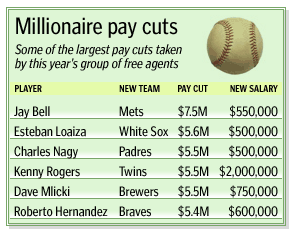
NEW YORK (CNN/Money) - For most of its first 25 years, baseball free agency was the path to fortune for ballplayers. This past off-season was the pay cut fast lane.
Of more than 100 free agents who had their 2002 and 2003 salaries widely reported, players seeing cuts in their guaranteed dollars outnumbered those seeing raises by better than two-to-one.
And the cuts were generally deep. Of the 76 players who saw pay cuts, the average decline was $1.7 million, or 60 percent of their 2002 guaranteed money.

Of course, in this time of war and economic trouble, it's tough to feel a lot of sympathy for the players who took the cuts. They still earn an average of $1.5 million this year. It's possible, probably even likely, that a lot of the veteran players getting a lot less money simply aren't worth their old salaries, not when there are comparably talented younger players available for much less money.
"(Former Tigers pitcher) Dave Mlicki made $6.2 million last year. This year he's making $750,000. Good," said Doug Pappas, the chairman of a group of baseball enthusiasts who study business issues in the game. "The problem isn't that he took a huge cut. The problem is he was never worth $6 million."
Still, the suddenly weak market for so many free agents raises some questions with Pappas and many others about collusion.
"I start getting suspicious when a whole bunch of teams wise up all at once," said Pappas.
The Major League Baseball Players Association has started an investigation into whether the owners are illegally colluding with each other to drive down free agent salaries, as they were found to have done from 1985 through 1987. The owners eventually had to pay $280 million to the affected players. Major League Baseball has denied there is any collusion this time around.
| SportsBiz
|

|
| Click here for SI.com sports coverage
|
|
|
|
But during those three 1980s' off-seasons, teams signed absolutely no free agents that were still desired by their old team, making it easier for the union to prove illegal behavior by the owners.
This time, there were still some big winners changing teams. Cleveland slugger Jim Thome signed an $85 million, six-year deal with the Philadelphia Phillies that will pay him an average of $14.2 million a year, up more than $6 million over his 2002 pay. Atlanta pitcher Tom Glavine also got a $35 million, 3-year contract that represented a 35 percent raise when he moved from the Braves to division rival New York Mets.
But for every Thome and Glavine, there were a couple of players like reliever Roberto Hernandez, an All-Star as recently as 1999, whose 2003 base pay of $600,000 is a 90 percent pay cut from his salary for Kansas City in 2002.
Even if the collusion case isn't as easy to make, critics of baseball management think the evidence of collusion is likely there.
"It's the difference between a very stupid bank thief and a very skillful one. It doesn't mean the skillful one will not get caught," said Marvin Miller, former president of the players' union.
| Related columns
|

|
|
|
|
Leading player agent Scott Boras says one thing that drove down salaries this year is teams let it be known among ownership which players would be made free agents through the non-tendering of offers in late December. That process slowed the signing of premier free agents earlier in the offseason, and flooded the market with a greater number of lower-priced players later in the offseason.
"They were doing this for market purposes, not to help the team individually," said Boras. "It's never in best interest of an individual club to disclose which player they're going to tender or not tender. The free agent market has been artificially manipulated by owner conduct."
Boras believes that the market will improve again next year when teams that went with younger players perform badly on the field and the ticket office. But it's also possible that the balance has shifted and the days of journeymen players getting more than fans earn in a lifetime are over. It may take another union win in court to stop the owners from using this past winter's winning strategy.

|

